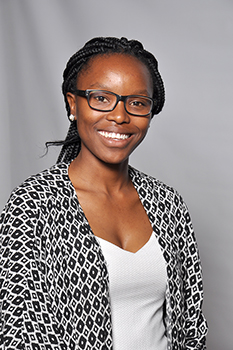Latest News Archive
Please select Category, Year, and then Month to display items
12 January 2024
|
Story Nonsindiswe Qwabe
|
Photo Sonia Small
 Since joining the UFS in 2008, Dr Grey Magaiza has worked extensively on approaches that can foster the socio-economic transformation of societies.
Since joining the UFS in 2008, Dr Grey Magaiza has worked extensively on approaches that can foster the socio-economic transformation of societies.
“The future should be one where communities can decide on their development agenda and futures. That’s the most important for me.” Dr Grey Magaiza, Deputy Director of the Centre for Gender and Africa Studies (CGAS) and Head of the Community Development programme on the Qwaqwa Campus, is passionate about capacitating communities to be agents of change and advancement. His vision for the future emphasises the empowerment of communities to take charge of their development by actively participating in decision making and the implementation of development projects that can improve their lives.
Since joining the UFS in 2008, Dr Magaiza has worked extensively on approaches that can foster the socio-economic transformation of societies. Over the years, he has crafted his research speciality into one that he is most proud of – being an interdisciplinary scientist immersed in the development of communities.
“I’m in a fortunate position of researching what I like. I say ‘fortunate’, because I’ve taken the time to understand what I’m passionate about, which is the overall field of rural livelihoods and livelihood futures – in short, community development. My research starts from an engaged university, understanding the elements that a university must use to enhance transformation and relevance to its immediate community in terms of development.”
One of the ways he has done this is by looking at social entrepreneurship as a development approach for young people in a rural setting. Through workshops with non-profit and civic organisations in Qwaqwa, Dr Magaiza has been helping these organisations to map out their needs and actively meet them through the involvement and support of external role players.
“We understand that communities are part of the national development agenda, but even that national agenda respects community knowledge and intentions and allows communities to shape their identity. A critical enabler of this is community organising. You bring back the capacity in communities to have dialogues on issues affecting them as spaces for engagement, knowledge exchange, and for people to just talk about their way forward.”
By enabling communities to define their development agenda, they can address their specific needs, challenges, and aspirations, he said. “When I look at livelihood futures, it’s quite an exciting aspect of my work – it’s like looking into a fortune tellers’ globe, because you’re not deciding for communities what they should do, but the communities themselves take those decisions.”
Meet our Council: Likeleli Mphutlane
2016-08-03
 Likeleli Mphutlane
Likeleli Mphutlane
The University of the Free State (UFS) has long been considered a leader in diversity. Its diverse character is nowhere more apparent than on the UFS Council, where different voices with differing viewpoints and diverse cultural backgrounds strive to lead the institution to greater heights.
One such voice belongs to Likeleli Mphutlane, who has been serving on the UFS Council since 2015. This dynamic young woman was born in Bethlehem, raised in Lesotho, and matriculated at Louw Wepener High School as a Matriculant of the Year Top 14 finalist.
Studies at the UFS
She completed a BAcc degree at the UFS, while serving as vice-primaria of Welwitschia Residence, after which she obtained a BAcc Honours degree from the University of South Africa.
She qualified as a Chartered Accountant in 2014. After gaining work experience at PricewaterhouseCoopers and SAB, she works now as an independent consultant in her own company, Inspire Innovation Business Consultants.
Likeleli serves on the audit and risk committee and the financial committee of the Council.
The difference she makes
"I believe that my role on the Council is to share my expertise and skills to ensure that the university upholds the highest standards of governance, and achieves its objectives of remaining financially sustainable. I also think that, as a black female alumnus, I bring a diverse viewpoint to the Council," she says.
While her responsibilities as co-founder of the Lesotho Young Professionals Forum, and chairperson of the Free State branch of the Association for the Advancement of Black Accountants South Africa, keep her busy, she enjoys physical activity, and travelling with her husband, Stephen Monyamane.